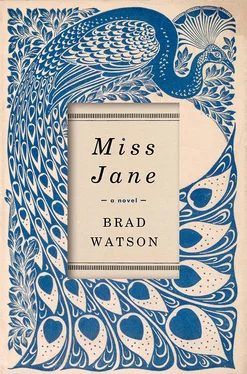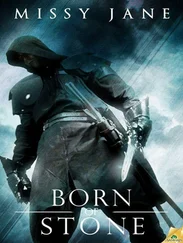She turned to face him. He looked down, took out his pocketknife and a little piece of wood he was carving on. Trying to cut back on the pipe-smoking.
“I believe it’s what he had in mind,” he said.
“Had in mind,” she said.
She looked out over the yard, at the work shed, the now-empty hog pen and its ramshackle fencing, the pasture sloping down to the cattle pond, no cattle there in the midday sun. Hardly seeing it all, really.
“Jane,” he said. “You’re a hearty person, your condition has no real effect on that. You have no unhealthy habits that I know of. It is likely that you will outlive your sister and brothers, and be alone one day. Without family, if you were able to live a less restricted life—” He stopped there.
Jane said quietly, “This has come to feel pretty normal for me.”
It had come over her, some sense of what it would be like to be truly alone. Her mother had become someone who seemed barely there, anyway. The doctor was fading a bit, no denying it now. She felt a heaviness, an almost fluid infusion of a palpable isolation. She would always be the odd one, the one with the secret. Who hurried from company without a word, returned a while later as if nothing were unusual about it. Who had taken to wearing several slips beneath her skirts, and a bit of perfume, in a ridiculously vain attempt to mask the fact of her body, her embarrassment.
But did it matter, really, anymore? She had now lived nearly eight years since moving to town, since giving herself up to the truth of what her life would be. A year out here with her mother, alone, and half a year alone since her death. And she intended to stay. She was not unhappy, she wouldn’t put that word to it. In fact she would not know how, even at her young age of just twenty-four years, to start over. To become someone else entirely. But she took an oblique tack.
“Even if they could make it work, you know I cannot pay. I know my father left that money to me but it seems right that I would manage it, in case others need it in a bad time. For something practical.”
The doctor looked away and took a deep breath as if to calm himself. His right hand shook a bit and he placed his left hand there to still it. He closed his pocket knife and put it away in his vest pocket.
“I’ll pay,” he said.
“No.”
“I will,” he said. “You understand, Jane. You have always been more than just a patient, to me. Lett and I had no children. I have no one to leave anything to, when I go. I have no one in my life, not here anyway. And no close family left, no one I even really know among them anymore. If you would let me at least do this for you, I would feel as if I have someone in this world who might see me as more than an affable stranger.”
“You’ve never been a stranger.”
She looked at him. She thought that indeed he might love her, in some way. The love of one human being for another, which does not demand classification or mode.
“He did it on purpose, didn’t he?” she said. “I’ve thought so, ever since the day.”
The doctor looked straight out over the yard, stone-faced.
She said, “You know yourself what can be done and what can’t. Don’t you? If you just own up to it. You want me to see these people because they’re the best experts, but you have been talking to them, corresponding with them, all of my life. You would know if they were able to fix me. Has your doctor friend in Baltimore actually given you some kind of confirmation?”
“What if they were at least able to repair the incontinence?”
“Has your friend actually suggested good odds on that? The man in Memphis said the way I’m made makes that highly unlikely. Has that changed?” Then she said more softly, “What are the odds, Ed? I think you want to believe it, but I think in your heart you either suspect or know that at this point they still cannot. What would be the point, if we’re honest?”
He looked startled, emotion in his face. Then looked away.
She thought of her father and her mind felt inflamed with unchecked emotions. She looked out to where she’d left the tomato worm. It was gone, leaf, stem, and all.
“I don’t want to make your life more complicated,” he said. “I thought, possibly, just the opposite, in the long run.”
“Well,” she said after a moment, as if to the yard, or to the strangely ravished, vanished worm, the billowing sky, the somewhere-feasting little wild bird — probably the flicker that was gone now from the apple tree, silent.
“Well,” she said. “It’s not complicated.”
They were quiet then in the still of the afternoon. The storm that had threatened seemed to have lost its strength and moved away. And then the doctor got back into his truck and left. She watched him drive off in a late afternoon light that seemed flickering, like the clickety light in a motion picture, color draining as if it, too, were in black-and-white, controlled by a steady hand turning a handle to keep the world in motion, by and by.
What the doctor had said to her, about caring for her. Some part of her was trying to absorb it, to understand how he had always helped her to feel less alone in the world. Less strange.
Dear Ellis,
I presented Miss Jane Chisolm w/ new possibility of at least marginal surgical repair to her condition. She is skeptical, and unwilling to bother without a greater degree of certainty on our parts. No more exploratory action, I’m afraid. She does have a good measure of her parents’ obstinacy, in addition to her own very independent nature. I offered to pay for it, myself. I cannot abide the idea of not at least trying. Finding out what can or cannot be done. Perhaps it is selfish, but I cannot abide such stubbornness, damned country stubbornness, when there is absolutely no practical reason not to seek the medical certainty, and every reason to move ahead should it be possible to do so.
I did not and never have even brought up the idea of colostomy. Personally, I wouldn’t see it as enough improvement, especially considering the risks for infection, etc. All things considered, she’s been very lucky in that way.
She believes her father caused his own death, w/ purpose. It would be impossible to know, of course, given his condition and habits. Beyond the philosophical sense, of course. How much this may have to do with her decision, I couldn’t say. If I had to guess, I’d say it’s a powerful influence.
Such quiet in this house in the evenings, with my Lett gone now almost twenty-two years. I have not and I suppose will never entirely surrender my grief. My peacocks, now so numerous, are a comfort though they are at least half-wild and sometimes their calls and cries bring up a feeling of loneliness as much as comfort. A strange beauty. Sometimes I wonder should I get a dog, maybe, and wonder why the hell I never did, especially after Lett died. I suppose it makes no sense to avoid it now simply because I’d most likely outlive it. But I probably won’t go to the trouble, at this age. Janie Chisolm would take it in, I believe, but I wouldn’t want anyone to be beholden.
Ed
And then there was the long quiet afternoon of autumn, then middle and late winter. Crows angling curious over the fields. Hawks hovering for mice exposed in sparse cover. A light cold breeze. Hard frosted soil. Evergreen pines seen through bare limbs of oaks, sycamores, sweetgums, hickories, maple, poplar, beech. The crooked, crazed, leafless pecans in the neglected grove, the weathered barn, rusted roof tin, rusted barbed wire, implements. Huddled cattle. Weathered grazing horse and mules. Gray scudded sky. She’d made arrangements for Harris, with new help from the return of Mister, to take on another twenty acres. Another eighty came under the hand of a man named Moss and his family, who were friends with the Harrises. The doctor had recommended she take on more colored people instead of whites. “More reliable, more trustworthy,” he’d said. “You learned that the hard way.” Moss was a big man, with a good sense of his own dignity. She gave him halves, and let him and Harris use of any of her father’s equipment they might need, at any time, if they promised to maintain it. She would pay for fuel and major repairs. She told him that if he needed to add on to the cabin the Temples had once occupied, she would supply him with lumber and nails.
Читать дальше












